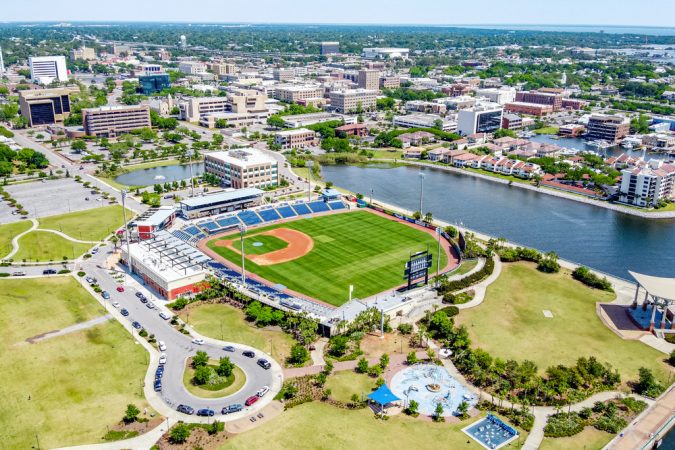
By Jeremy Morrison
Raising concerns about finances, the potential for gentrification and “opportunity hoarding,†the Pensacola City Council cast a collective sideways glance at the prospects of a deal involving tax and lease breaks in exchange for a parking garage at Maritime Park.
“Is it 99 years they don’t pay a lease?†questioned Councilwoman Jennifer Brahier.
Pensacola Mayor Grover Robinson was quick to reframe the math during the, at times, tense discussion.
“In reality, we’re not giving up the ground lease,†he contended, “we’re getting $10 million.â€
On the table is a potential deal between the city and a pair of developers, Silver Hills and Edwards Communities Development Companies, parcels 4 and 5 at Maritime Park. The developers are proposing 375 and 450 residential units, a parking garage, and 10,000 square feet of commercial space on these two parcels.
The parking garage, the lynchpin in this deal, would be about a thousand spaces and cost around $19 million; this is twice as big as the development itself needs. In exchange for parking garage expansion, or about $10 million, the developers would get a 99-year lease, the first 10 years of which would include a break on local property taxes amounting to about $4.4 million in total.
Mayor Robinson has described the need for a parking garage as essential to attracting further development at the park.
“For us to reach the potential of what Maritime Park could become, it was always expected that that piece was an integral part,†he said Monday evening, imploring the council to seize the deal: “All we have to deal with is the Silver Hills deal, and we’d have our parking deck and could move forward.â€
Council appeared to agree with the mayor’s logic — “I think everybody agrees we need to build the parking garage,†said Councilwoman Sherri Myers — but there were still a lot of questions.
“I like the project,†Myers said, “but it’s the finances that I have a question about.â€
Council members seemed iffy on the proposed tax and lease breaks, even considering the parking garage trade-off. And they wondered if those breaks would be passed on if the developers sold the properties.
“Like what happened to Southtowne?†Brahier pointed out, referencing the mixed-use development downtown.
According to Chris Rowe, an outside attorney brought on board by the city, those breaks would most likely be passed along.
“My sense is, the developer would probably want to preserve that,†Rowe said.
Also of concern was the number of residential units being proposed for the development. At the low end of 375, it far exceeds a 60-units-per-acre cap.
“They can get to 375 with density bonuses,†Robinson said, pointing out workarounds to the cap.
Another concern identified by Councilwoman Teniade Broughton was the players involved in downtown development efforts tended to be part of a recurring cast.
“What I see in a lot of this is opportunity hoarding,†Broughton said, suggesting that perhaps some other developers and real estate players, specifically from the minority community, should be brought into the circle.
Broughton also voiced concerns about what impact such a development—the first under the West Main Sector Plan, which includes Maritime Park and the former 19-acre ECUA property across the street—would have on the surrounding area. She noted the constant creep of downtown development ever farther to the west, into the historically African-American Tanyards neighborhood.
“I’m really concerned about the effect of gentrification of this project, especially when you start talking about luxury apartments so close to the Tanyards,†Broughton said.
The councilwoman pointed to another downtown development as an example of gentrification: Aragon, formerly known as Aragon Court, a low-income housing project constructed during the segregation era.
“I’m old enough to remember Aragon,†Broughton said. “I don’t want to see that for the Tanyards.â€
The councilwoman also pointed out that longtime residents of neighborhoods like the Tanyards have long lodged concerns about issues such as flooding, but only now, with high-dollar development on the doorstep, is the city getting serious about addressing the issue. She quoted poet Maya Angelou in making her point: ‘they grow the fruit, but eat the rind.’
“We’ve had enough of growing the fruit and eating the rind,†Councilwoman Broughton said. “And what I’m here to say is if the Tanyards does not eat, no one will eat.â€



